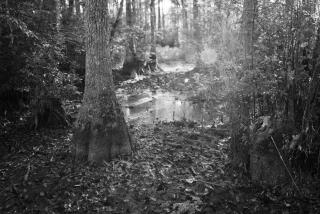From: The Black Hills: God Without Humanity
- Share via
Someone said some time ago: the desert is just God
without humanity.
He could have said the Black Hills. The Paha Sapa.
These hills make bumps, outcroppings of stone
fringed by pines, an outbreak of fantastic symptoms
of mountains to come further west.
Clouds have crashed and turned to rocks.
The Black Hills lie at the crossroads where
Wyoming, Montana and South Dakota,
unemployed, all hang around a corner. Geological
death is here.
Something that has lasted beyond death is here.
Spirit is here. Death far greater in scale than our
own is here. A vast mimicking of immortality.
Perhaps that is why you can see that they are holy.
The place is holy. Visions can be cried for here.
Here a bear might speak to you; a line of ants; a
wolf look up suddenly; an otter tell all you need to
know; a spider too, perhaps. Perhaps that is why
you can see that they are sacred. Perhaps it is what
sacred means, what holy means: that which imitates
that which does not vanish.
From “We Need to Dream All This Again: An account of Crazy Horse, Custer, and the Battle for the Black Hills” (Viking: $15.95; 101 pp.), a retelling, in prose and poetry, of the battles between the United States and the Lakota, the Arapaho, the Tsistsista and other native peoples. Bernard Pomerance, a dramatist, is the author of “The Elephant Man” and other plays. This is his narrative and poetic debut. 1987 Bernard Pomerance, by permission.
More to Read
Sign up for Essential California
The most important California stories and recommendations in your inbox every morning.
You may occasionally receive promotional content from the Los Angeles Times.












